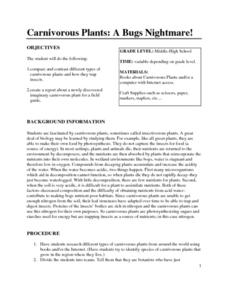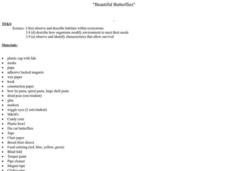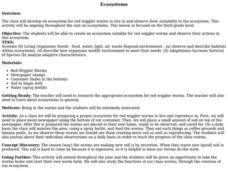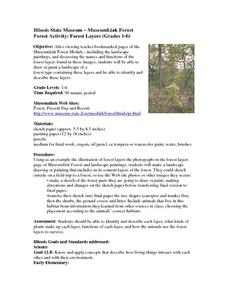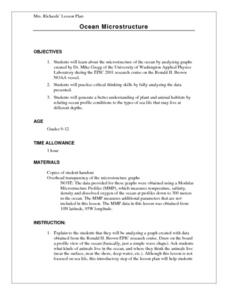Curated OER
Carnivorous Plants: A Bugs Nightmare!
Students research carnivorous plants and how they trap insects. They role play as botanists to write a research field guide about a newly discovered imaginary carnivorous plant.
Curated OER
Going for the Green
Students use satellite imagery to obtain information on chlorophyll concentration at selected locations in the Earth's oceans.Students explain the relationship between chlorophyll concentration and primary production.Studen
Curated OER
Mapping Seamounts in the Gulf of Alaska
Students describe major topographic features on the Patton Seamount, and interpret two-dimensional topographic data. They create three-dimensional models of landforms from two-dimensional topographic data.
Curated OER
Pawing Around
Students identify common wildlife by investigating their footprints. They examine where and how to look for signs of animal activity. They create casts of animal tracks and gather information about the animal from the location it was found.
Curated OER
Beautiful Butterflies
Third graders study the life cycle of the butterfly through this series of activities. They create projects, play games, and observe butterfly characteristic that contribute to their survival.
Curated OER
Ecosystems
Third graders create an ecosystem for red wiggler worms to observe as they work on a complete unit.
Curated OER
Household Pests
Sixth graders discover the various habitat requirements for assorted household pests from ants to wasps. They conduct various activities including researching the life cycles moths, cockroaches, and mosquitoes
Curated OER
Creating a Cranimal
Students design their own mix and matched animals. They reinforce their literacy by working with pieces of animal names to invent a new animal. They use their drawing skill using a lesson framework that emphasizes transformation.
Curated OER
Microworlds in Waterways Around You Home
Students explore the concept that different waterways support different organisms. After completing experiments, students predict what life-forms exist in each waterway in their area. They research how humans impact the habitat of other...
Curated OER
Astronauts Train in Deep-Space Brine
Students examine an article on astronauts training in deep space brine then discuss what they learned. In this investigative lesson students get into groups and design an exercise that includes isolation, silence and conflict...
Curated OER
Sorting Pond
Students practice balancing while learning the classifications of different animals
Curated OER
Save Me: Mother Earth
Students read stories and articles about protecting the Earth. They collect data for a computer generated graph, and provide a key to show what the symbols represent.
Curated OER
Ocean Microstructure Lesson Plan
Young scholars explore the microstructure of the ocean by analyzing graphs created by Dr. Mike Gregg of the University of Washington Applied Physics Laboratory during the EPIC 2001 research cruise on the Ronald H. Brown NOAA vessel.
Curated OER
Survival of the Fittest
Sixth graders create their own "never before seen" marine creatures and examine how not all creatures in the sea swim, not all have sharp teeth
Curated OER
Creating Communities
Students design a community with minimal environmental impact. They rate each other's community's presentation using the "Planning and Zoning Commission Rating Scale".
Curated OER
Forest Activity: Forest Layers (Grades 1-6)
Young scholars use the Museumlink Forest Module to view landscape paintings and discuss the names and functions of the forest layers. They paint or draw a landscape of a forest with the layers and explain them.
Curated OER
Leaving Home
Students explain the importance of larval dispersal and retention to populations. They collect data on organisms and examine it.
Curated OER
2005 Hidden Ocean Expedition What's Eating You?
Analyze data and make inferences about the trophic position of organisms in the Canada marine food web. After a review of the geography and formula, discuss results and write an essay to improve the understanding of Artic food webs.
Curated OER
Creative Insects
Third graders examine insects that are common around the school. They write a creative story about being an insect for a day and include scientific data that they learned.
Curated OER
Ocean Microstructure
Students assess the ocean's microstructure by analyzing graphs created during tne Ronald H.Brown research cruise. they discuss at what depths various sea animals live and write paragraphs on data analysis from the graphs.
Curated OER
How To Save The Planet
Students work together in groups to create a book about how to save the environment. They are to research ways to help the environment and assemble them into the book. They can even design a cover if they choose.
Curated OER
The Rock Cycle
Third graders, in groups, examine soil samples with magnifying glasses. They discuss the living and non-living things they find in their soild samples.
Curated OER
Environmental Education
Second graders examine how their choices affect the environment. They identify different types of pollution and its source. They ask questions to end the lesson.
Curated OER
The Story that Tracks Tell
Eighth graders observe and investigate animal tracks. They draw prints for local animals and switch with another student to guess the animal, identify animal tracks in a nearby wood lot, create plaster casts of the tracks, and write a...
Other popular searches
- Animals Water Habitats
- Animal Water Habitats
- Land or Water Habitats
- Shallow Water Habitats
- Water Habitats Lesson Plans
- Describe Water Habitats
- Water Habitats Rivers


